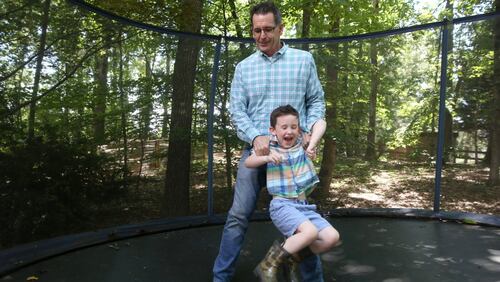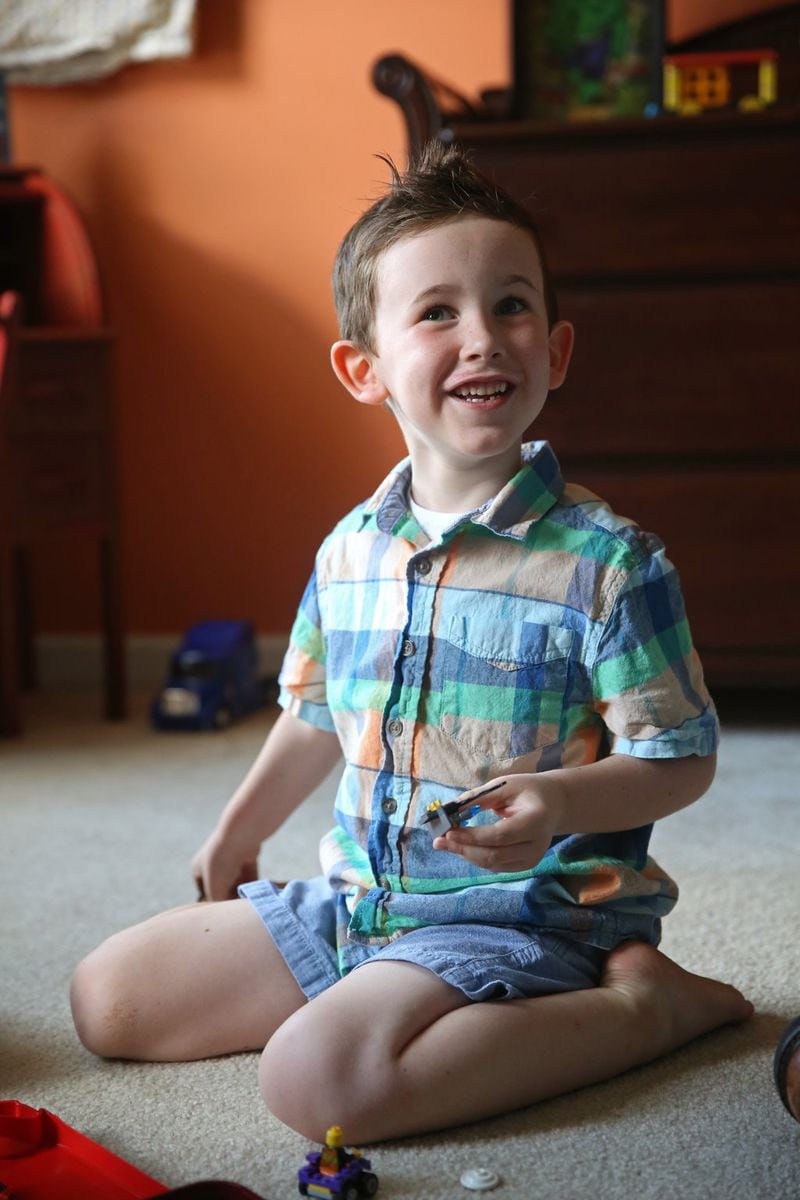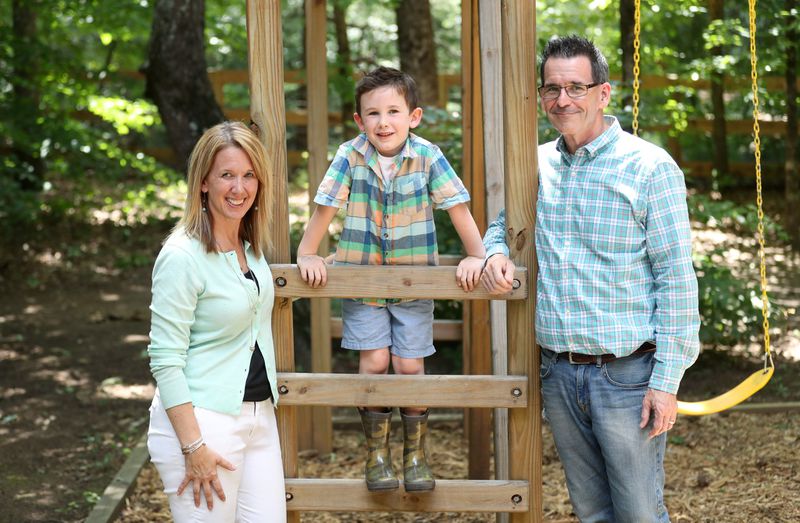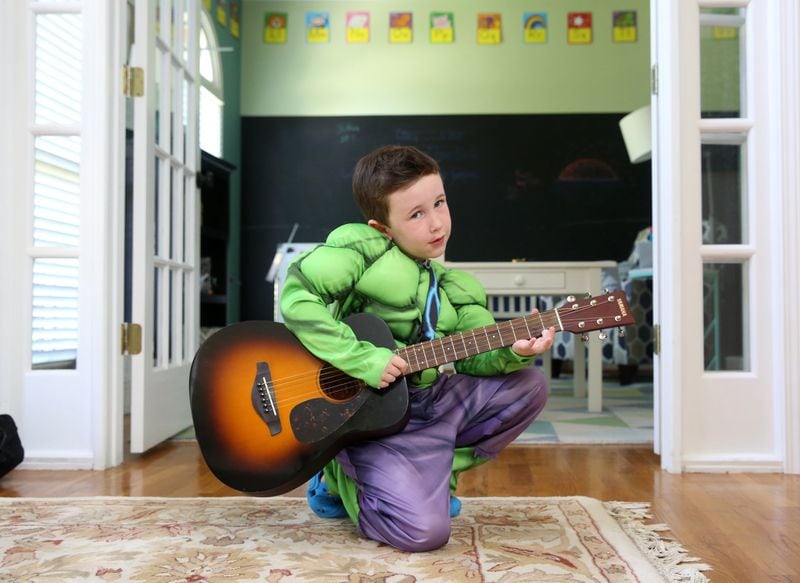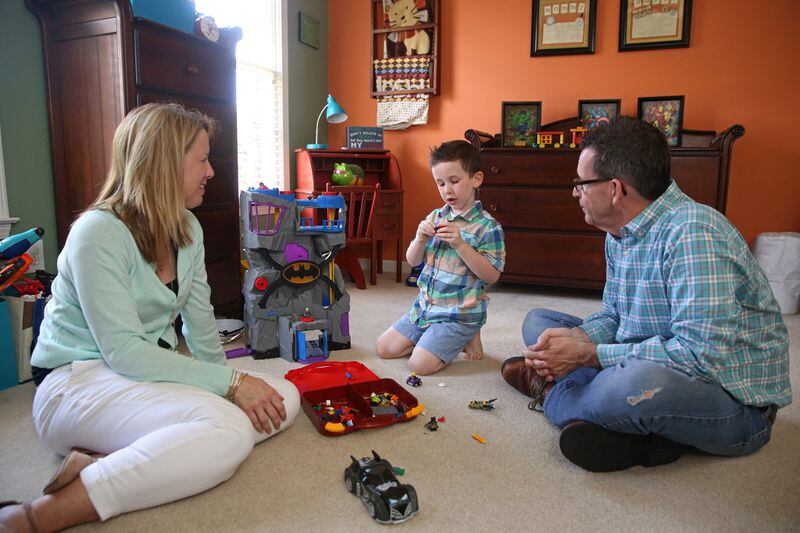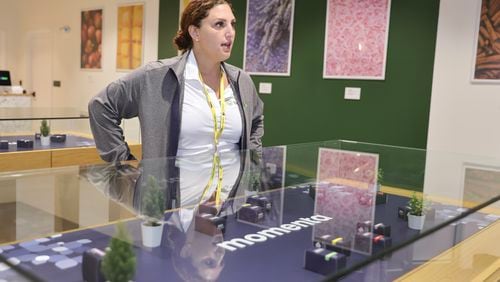Does 5-year-old Joshua Davis have powers beyond those of mortal men? He can play the guitar, drive a truck, identify dinosaurs, and shoot lasers out of his eyes.
He only pretends to shoot lasers, actually, usually when he has his Iron Man costume on, and he’s running around his Johns Creek house.
But Joshua’s strongest superpower is his gift of gab. Friends, relatives, passers-by, anyone who will listen is liable to be drawn into a discussion with Joshua, usually about Lego Batman, Spider-Man, dinosaurs or Power Rangers.
Joshua can be persuasive, and his conversational skills were put to good use this spring when he traveled to Washington, D.C., to speak on behalf of a man who is sometimes at a loss for words: his father.
"I know what I want to say, but when I'm ready to say it, I don't know," said Daniel Madison "Mat" Davis, 55. Davis was a programmer for 35 years, a college professor, a saxophonist, a fellow who has worked for Boeing and NASA, a rocket scientist in other words. But his memory is slowly leaving him, as he shows the signs of early-onset Alzheimer's disease.
The symptoms began to appear around 2012. He will go to the kitchen to get something, but forget what he wanted when he gets there. Youthful, trim, bespectacled, an enthusiastic partner in Lego building and trampoline jumping, Mat seems, at first glance, to be unaffected. He engages in conversations and tells stories. And then his thoughts run aground. "I had a little problem with the pronouns, just then," he will say to his wife, Tammy.
“It makes it hard to watch him losing things that are part of him,” said Tammy, 45, on a recent afternoon, as Mat listened. “It takes away the person that I know.”
Tammy is an IT professional, too, and a problem solver, and she is not inclined to stand still as the juggernaut of Alzheimer’s bears down on her family. She’s raised thousands of dollars hosting events such a dusk-to-dawn run/walk marathon on the weekend of the summer solstice.
This spring, she gathered her husband and son and traveled with a 30-person delegation from the Georgia chapter of the Alzheimer's Association to speak to elected officials and members of their staffs in Washington, D.C.
The yearly event, called the Advocacy Forum, is intended to encourage members of Congress to boost the funds allotted to the National Institutes of Health (and other organizations) to fund research in the fight against this inexorable death sentence.
The Alzheimer’s Association estimates the NIH will need to spend $2 billion a year to develop a treatment, which is several hundred million more than it spends now.
More than 5 million Americans are living with Alzheimer’s, a number that will triple by 2050, according to the association. The disease brings a huge cost in dollars. We will spend $259 billion this year to care for Alzheimer’s patients and those suffering from other dementias.
The human cost is even higher. Alzheimer’s patients eventually lose the ability to speak, walk and swallow, and often die of pneumonia. Caregivers also pay a price, often working the equivalent of a full-time job by looking after a spouse or a parent.
Tammy spoke to staff in offices of U.S. Sen. Johnny Isakson and U.S. Sen. David Perdue, and, back in Georgia, convened with state Sen. David Shafer, president pro tempore of the Georgia Senate, to seek more research dollars.
Her secret weapon was Joshua Davis, who came along on the D.C. trip, dressed in what he calls his “sharp suit.” He went, he said, “’cause daddy’s sick. We wanted them to help him.”
When the Davis family spoke about the challenges they face, Joshua garnered the most attention. The Davises found some of their listeners in tears. “I was crying, too,” said Tammy.
“It was something, to see them there as a family, speaking,” said Ginny Helms, vice president of chapter services and public policy for the Alzheimer’s Association of Georgia.
It is also inspiring to see them as a family, just playing. Joshua, in his Hulk costume, performs on guitar. (He hasn’t learned any chords yet, but he has the right attitude.) While Joshua drives his battery-powered “gator” around the backyard, his parents dodge out of the way. Joshua and Mat bounce and wrestle on the trampoline.
Mat has maintained his composure as his world has changed. He gave up his car keys voluntarily, and rides his bicycle around Johns Creek. He worries about Tammy, who later that afternoon will check in on Mat’s father, Aubrey “Dan” Martin, who is on dialysis. Mat wants her life to be easier. He witnessed his own mother’s struggle with Alzheimer’s. (She’s gone now.)
“I’m always amazed at my wife,” he says. “Whatever we can do to take the load off of her, I want to do.”
Tammy gets enormous comfort from her church, Christos Community Church, and very purposefully lives in the present. Yes, she is concerned about health care legislation, and possible cuts to Medicaid. Medicaid pays for 73 percent of people in nursing homes, and most of them have some form of dementia.
But Tammy tries not to think about weeds in the yard, or what will happen next year. “You can’t live like that,” she says.
Mostly, she wants to see that this moment, right now, stays with Joshua.
“One of my prayers is that Josh remembers his dad, in a good way.”
Mat is easy to remember, not least because there’s a pint-sized version of Mat, running around the backyard of a house in Johns Creek, same dark hair, same impish smile. Joshua is an aspiring musician, like his father. He wants to go into the sciences — “I want to be the guy that digs up dinosaurs,” he says — like his father.
And he understands how to use his superpowers for good. On the bureau in Joshua’s room is a plaque that says it all:
“Some people don’t believe in superheroes, but they haven’t met my Dad.”
IN OTHER HEALTH NEWS:
